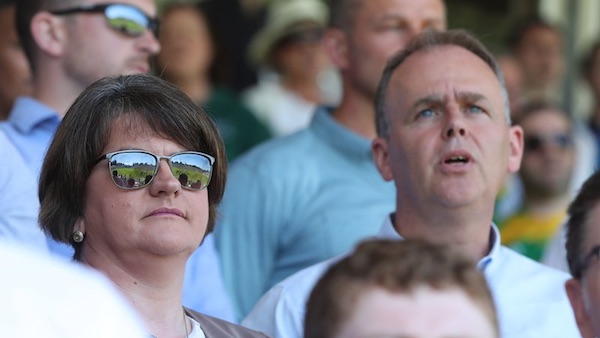
A series of choreographed political gestures could be preparing the way for a return of the Stormont Assembly as both Sinn Fein and the DUP have said they are ready to restore the Six County political institutions.
Speculation increased this week following an expression of regret by Ms McDonald to “those who were hurt by the IRA”. Ms McDonald told the loyalist News Letter she would like to meet the anti-Catholic Orange Order and would attend Orange parades “if I’m invited”, although that suggestion was quickly spurned by Orangemen.
But there was reciprocation in the form of the attendance of DUP leader Arlene Foster at a Gaelic football match. Ms Foster appeared at the GAA Ulster Final in Clones, County Monaghan, accompanied into the stadium by former DUP Assembly member Christopher Stalford and Fine Gael Minister Heather Humphreys, a TD for Cavan-Monaghan who is from a Protestant background.
Foster appeared uncomfortable during the playing of the Irish national anthem, but later smiled and was photographed alongside Sinn Fein’s Deputy leader Michelle O’Neill.
Ms McDonald said the gestures had helped create an atmosphere in which the power-sharing institutions could get back up and running. She called for more action from the Dublin and London governments to break the recent stalemate and insisted gestures of reconciliation are “crucially important”.
“They are about reaching out the hand of friendship across the community - they are about demonstrations of respect and courtesy and friendship and I want to commend her for that,” she said.
“I want to say that gestures are more than tokenism, gestures have to then give expression to real political change and advancement. To get the institutions back up and running we need good will, we need the right atmosphere - I think yesterday Arlene contributed to that and then the issues that are outstanding need to be resolved.”
Following the collapse of Stormont over corruption allegations and the DUP’s long-standing resistance to civil rights and equality issues, negotiations to restore Stormont ended in mid-February, and the two parties and have had limited contact since.
Mrs Foster’s gesture follows Ms McDonald’s own controversial meeting with English Prince Charles Windsor, the titular chief of the regiment which carried out the Bloody Sunday massacre, during his recent trip to Ireland.
It was also no coincidence that the Sinn Fein leader indicated that her party has dropped its “red line” demand that Arlene Foster must step aside while under investigation by a public inquiry into political corruption in the North.
In her interview with the News Letter, Ms McDonald said that “politics has moved on” since February, when negotiations broke down. She indicated that she is prepared for her party to return to Stormont with Mrs Foster if the DUP agrees to other conditions, such as an Irish language act.
“The world moves, you know,” she added. “We’re not static.”
Sinn Fein’s Mairtin O Muilleoir has also indicated the DUP’s veto on marriage equality was no longer a “red line” for a return to Stormont. His comment followed a landmark talk given by Foster at an LGBT event at Stormont, during which she insisted her party’s opposition to homosexuality should be respected, but that she “values” members of the LGBT community.
The next step is expected to see Ms McDonald and other Sinn Fein leaders greet English royal couple Prince Harry and Meghan Windsor on their first visit to Dublin. It comes despite the controversial award to the Prince by the English Crown of the newly-created barony of Kilkeel, in County Down, on the occasion of his recent marriage.
British Prime Minister Theresa May is also to visit the North for talks “in the next few weeks”, while later in July, the British Irish Inter-Governmental Conference is set to meet for the first time in more than a decade.
The body, which brings together the Dublin and London governments is due to meet in London on July 25. In the absence of devolution in Belfast, the conference should be the vehicle through which the 26 County state exercises a consultative role in the North, although Arlene Foster has rejected this, and dismissed it as a “talking shop” and a “distraction”.
Mary Lou McDonald welcomed the meeting of the BIIGC and urged the British government “to approach the conference with common sense and put the imperative of restoring the executive ahead of its dependency on the DUP.”
![[Irish Republican News]](https://republican-news.org/graphics/title_gifs/rn.gif)
![[Irish Republican News]](https://republican-news.org/graphics/title_gifs/harp.gif)

